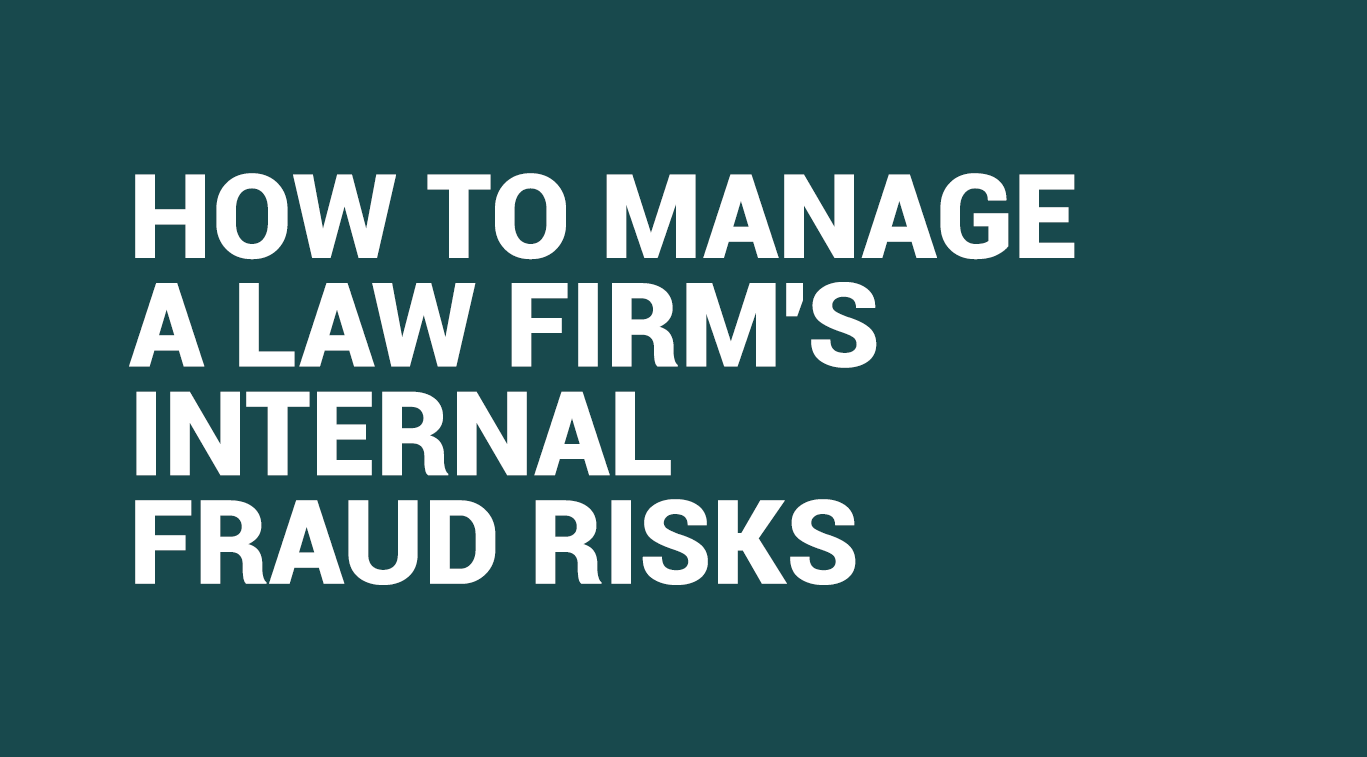How to Manage a Law Firm's Internal Fraud Risks

Written by Ashley McDermott
Blogger

When it comes to law firms, there is no such thing as being too careful when safeguarding against internal fraud risks. Since 2019, almost 19,000 reports of thefts undertaken by an employee were reported, and that’s just the losses detected. Out of the 45 police forces that released the data per the Freedom of Information Act (FOI), Northamptonshire, Warwickshire, and Cheshire are the areas with the highest reported occupational theft [1].
Further statistics show, in reality, the number of employee thefts is actually significantly higher, with around 75% of employees confirming they have stolen from their workplace at least once to some degree[2].
Given the high stakes involved, it’s no wonder that law firms are particularly vulnerable to employee theft and fraud. After all, many law firms deal with large sums of money daily and often handle sensitive client information. Internal controls, which can be made simple by utilising legal practice management software, are critical for any law firm to manage and monitor these risks.
Internal Fraud Risks in Law Firms
As a lawyer, your day often involves meeting clients and dealing with paperwork. What this can often mean is that you are not as hands-on in the day-to-day running of your law firm as you might like. As a result, it can be easy to miss the signs that something is not quite right. With UK businesses losing approximately £76 million a year to employee fraud, it’s essential to understand what areas of your business are more susceptible to internal theft risks. The areas at highest risk for fraud are usually billing, expenses and data theft[3].
While these are just some of the more common types of internal fraud that law firms may face, it’s important to remember that any kind of theft or fraudulent activity could potentially jeopardise your firm’s reputation. Many high-risk areas for internal fraud can be managed using cloud data protection services, including features such as HR software for law firms and law firm billing software.
How to Manage Internal Fraud Risks in Your Law Firm
The first step to minimising the risk of internal fraud in your law firm is to put systems and controls in place to identify any potential red flags. Some of the things you can do to help with this include:
Conduct Regular Audits
You should conduct regular audits of your financial records as a law firm. Not only does having an insight into the workings of your firm help with overall business management, such as your firm’s cash flow, but it also allows you to identify any potential areas of risk. If you notice any unusual activity, such as significant or unexplained discrepancies within business or trust accounts, this could signify something is not quite right. As provided by Good Law Software, legal practice management software offers insight into all areas of your law firm’s finances and can help identify any potential issues.
You could also conduct ‘surprise’ audits. So long as your employees know this is a possibility, carrying out random audits can help deter potential fraudsters, as they will know that their activities could be uncovered at any time[4].
Implement Segregation of Duties
One of the best ways to help prevent and detect fraud, where possible, is to implement a segregation of duties policy within your firm. Doing this means having more than one person responsible for different aspects of the business[5]. For example, you might have someone responsible for inputting data and another person responsible for checking it, either manually or with the help of legal tech. Separating tasks helps to ensure that no one person has complete control over any single area of the business, which makes it more difficult for fraudulent activity to go undetected.
Pre-screen Potential Employees
When recruiting new employees, it’s important to carry out thorough background checks. Legal practice HR software can help to simplify this process by automating employee screening. Not only does this allow you to see if they meet the job qualifications, but it will also alert you of any red flags[6]. This advancement in legal cloud solutions can undertake the running of background checks and credit reports, which is vital when hiring new members of staff.
Encourage an Open and Honest Culture
It’s vital to create an honest culture within your law firm, where employees feel comfortable coming forward with any concerns. You can do this by leading by example and ensuring that you have an open-door policy where employees feel like they can approach you with any problems or concerns they might have[7]. You should also ensure that you give employees regular feedback and encourage them to give you feedback too.
Employee training is also a brilliant way to help create and maintain an open and honest culture within your firm. After all, it is noted in a PricewaterhouseCoopers (PwC) report that more than three-quarters of CEOS state compliance issues are a huge threat to business[8]. Providing employees with regular training on topics such as anti-fraud measures and ethical conduct can help ensure that everyone is on the same page regarding the standards you expect from them[9].
Have an Adequate Insurance Policy
No matter how much you try to minimise the risk of internal fraud in your law firm, there is always a chance that something could go wrong. While it is a good idea to make use of law office solutions, such as legal firm software, to streamline the above processes, it is also important to have an insurance policy in place that will cover you in the event of any fraudulent activity.
Some things you might want to consider including in your policy are professional indemnity insurance, cyber and crime insurance. Cyber insurance, in particular, is growing in popularity as the threat of cybercrime increases. In fact, in 2020, 29% of law firms reported some form of a security breach[10].
Conclusion
Internal fraud is a real risk for law firms of all sizes, but there are steps you can take to help minimise the risk and protect your business. From implementing segregation of duties to conducting regular audits with the help of legal firm management software, taking these measures can help to create a culture of honesty and openness within your firm. Not only can this create a better working environment for employees, but it also helps to protect your business from any potential fraudulent activity.
Resources
[1]The frequency of employee theft in the UK – HR News
[2]Your Employees Are Probably Stealing From You. Here Are Five Ways To Put An End To It. (forbes.com)
[3] 22 Eye-Opening Employee Theft Statistics in the Workplace (thecircularboard.com)
[4]Why Law Firms Need Internal Controls (experts.com)
[5]Focus on Law Firms: Managing Law Firm Fraud Risks – An Internal Control Checklist (rubinbrown.com)
[6]Pre-Employment Screening: Everything You Need to Know | Eddy
[7]The Call’s Coming From Inside: Fighting Fraud in Your Law Firm – ORBA
[8]The Practice | The Emergence of Compliance (harvard.edu)
[9]Ethics Training Examples: 6 Successful Programs That Were Conducted (getimpactly.com)
[10]]Ransomware Attackers Take Aim At Law Firms (forbes.com)








